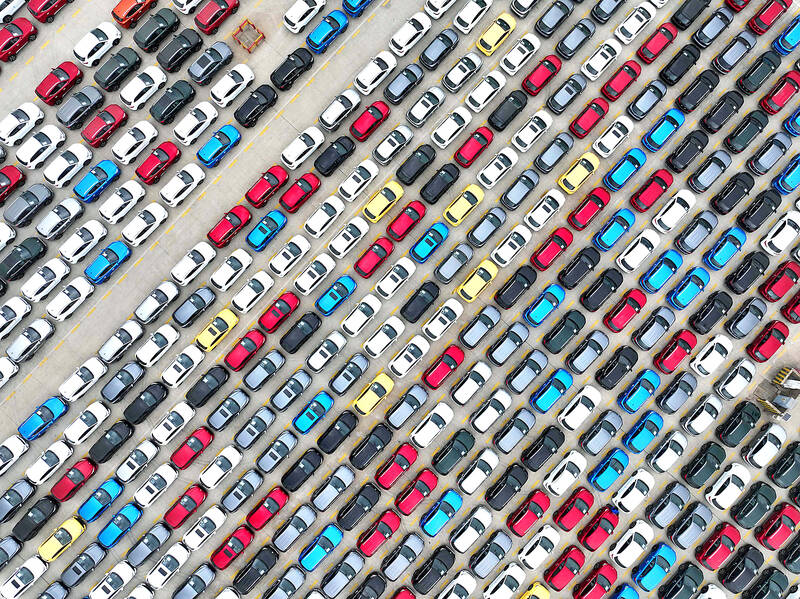US President Donald Trump said he would prefer not to have to impose tariffs on China, his latest dovish remark toward the world’s second-biggest economy even as he continues to threaten sweeping action.
Asked if he could stop the Chinese president from taking Taiwan and reach a trade agreement, Trump told Fox News host Sean Hannity that the US had a “very big power over China, and that’s tariffs, and they don’t want them.”
“And I’d rather not have to use it. But it’s a tremendous power over China,” he said in the interview that aired on Thursday.

Photo: AFP
Trump has wielded tariffs as a frequent threat against friends and adversaries, while promising voters that the additional revenue would help fund his domestic priorities.
On his second day in office, he threatened to put 10 percent tariffs on China as soon as Saturday next week for allowing fentanyl to “pour” into the US.
Markets have taken it as a positive sign that Trump stopped short of imposing tariffs on China in his first days in office, and his recent threats were softer than those issued last year. During his presidential campaign, the Republican floated additional levies on China of about 60 percent.
The yuan extended gains and rose 0.6 percent in both onshore and offshore markets after Trump’s latest comments. Chinese stocks also extended gains, with the benchmark CSI 300 Index ending the day up 0.8 percent.
In Beijing, Chinese Ministry of Foreign Affairs spokeswoman Mao Ning (毛寧) yesterday said there were “huge common interests” between the US and China.
“The two sides should step up dialogue and consultation,” she said at a regular press briefing.

TRUST: The KMT said it respected the US’ timing and considerations, and hoped it would continue to honor its commitments to helping Taiwan bolster its defenses and deterrence US President Donald Trump is delaying a multibillion-dollar arms sale to Taiwan to ensure his visit to Beijing is successful, a New York Times report said. The weapons sales package has stalled in the US Department of State, the report said, citing US officials it did not identify. The White House has told agencies not to push forward ahead of Trump’s meeting with Chinese President Xi Jinping (習近平), it said. The two last month held a phone call to discuss trade and geopolitical flashpoints ahead of the summit. Xi raised the Taiwan issue and urged the US to handle arms sales to

A magnitude 5.6 earthquake struck off the coast of Yilan County at 12:37pm today, with clear shaking felt across much of northern Taiwan. There were no immediate reports of damage. The epicenter of the quake was 16.9km east-southeast of Yilan County Hall offshore at a depth of 66.8km, Central Weather Administration (CWA) data showed. The maximum intensity registered at a 4 in Yilan County’s Nanao Township (南澳) on Taiwan’s seven-tier scale. Other parts of Yilan, as well as certain areas of Hualien County, Taipei, New Taipei City, Taoyuan, Hsinchu County, Taichung and Miaoli County, recorded intensities of 3. Residents of Yilan County and Taipei received

Taiwan has secured another breakthrough in fruit exports, with jujubes, dragon fruit and lychees approved for shipment to the EU, the Ministry of Agriculture said yesterday. The Animal and Plant Health Inspection Agency on Thursday received formal notification of the approval from the EU, the ministry said, adding that the decision was expected to expand Taiwanese fruit producers’ access to high-end European markets. Taiwan exported 126 tonnes of lychees last year, valued at US$1.48 million, with Japan accounting for 102 tonnes. Other export destinations included New Zealand, Hong Kong, the US and Australia, ministry data showed. Jujube exports totaled 103 tonnes, valued at

BIG SPENDERS: Foreign investors bought the most Taiwan equities since 2005, signaling confidence that an AI boom would continue to benefit chipmakers Taiwan Semiconductor Manufacturing Co’s (TSMC, 台積電) market capitalization swelled to US$2 trillion for the first time following a 4.25 percent rally in its American depositary receipts (ADR) overnight, putting the world’s biggest contract chipmaker sixth on the list of the world’s biggest companies by market capitalization, just behind Amazon.com Inc. The site CompaniesMarketcap.com ranked TSMC ahead of Saudi Aramco and Meta Platforms Inc. The Taiwanese company’s ADRs on Tuesday surged to US$385.75 on the New York Stock Exchange, as strong demand for artificial intelligence (AI) applications led to chip supply constraints and boost revenue growth to record-breaking levels. Each TSMC ADR represents